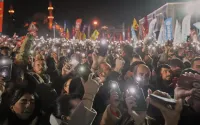6 January 2007The Independent
Disastrous floods yesterday brought the gleaming, modern capital of Indonesia to a standstill. Outside the glass tower blocks of Jakarta, the streets were deep in filthy water - bringing fears of disease. Nearly 340,000 people are believed to have fled their homes before the rising waters.
A metropolis that was a source and symbol of Asian pride has been brought to its knees by days of torrential rain - and years of reckless urban planning. The storm drains that were supposed to clear the water were blocked with rubbish. The forested hillsides to the south of the city that used to prevent such floods are gone, cleared to make room for the villas of the rich.
But rich and poor alike have been swept from their homes by the water. Some people resorted to horse-drawn carriages to get through streets flooded too deep for any car. Others fled to the upper storeys of apartment blocks, where they had to wait to be rescued.
The real fear is disease. At least 29 people have been killed by the floods, but that number could rise drastically if there is a major outbreak. "We have to be alert for diseases like typhoid, those transmitted by rats, and respiratory infections," said the Health Minister, Siti Fadilah Supari. "Hopefully, there will be no dysentery. We know it's hard for the residents [to keep clean] under the circumstances, but they have to."
The skies cleared yesterday and residents began to pump some of the water. But the Indonesian meteorological agency warned that more downpours could be on the way.
Indonesia suffers heavy monsoon rains annually, but this is the worst flooding to hit the capital for years, and local newspapers are demanding to know why more has not been done to prevent it - especially after Jakarta's governor, Sutiyoso, promised action after floods five years ago.
But he refused to take responsibility. "There is no point in throwing abuse around. I was up till 3am this morning trying to handle the refugees."
The Indonesian authorities are notorious for their inaction in the face of natural disasters, and many Jakarta residents gave vent to their anger yesterday. "The government is awful," said Augustina Rusli, who lived on the second floor of her house for four days with her 10-month-old baby. "We have a neighbour who is sick with cancer but no one has come to rescue her."
Tapwater was unavailable in several parts of the capital, and wealthy residents hired bowsers for deliveries. Many residential areas and major roads in west and north Jakarta, as well as at least one key intersection in the city centre, were flooded, triggering huge traffic jams. The toll road to the airport was restricted to high-wheeled vehicles.
In Kelapa Gading, an area of north Jakarta with new malls and many young professionals, some residents abandoned their homes using rafts made of wood, plastic water jugs and inflatable mattresses.
Traders also used floats to sell goods door-to-door.
About 2,000 people, including a newborn boy, were camped under a flyover in east Jakarta.
Some businesses closed because of a lack of phone lines, while others put up key staff in hotels. "I've been trying to find a way to the office, but everywhere is blocked by the floods," one commuter, Tumiran, said.
In some supermarkets there was panic buying of essentials and meat prices rose, while the US embassy advised its citizens to keep adequate supplies of food and drinking water at home.
But the rupiah remained stable and stocks were down just 0.4 per cent, as economists played down any inflationary concerns. "This will not change the long-term inflation trend," said Purbaya Yudhi Sadewa, of the Danareksa Research Institute.






